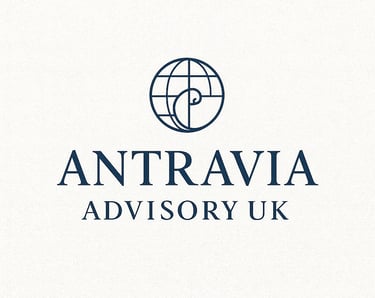Companies House Identity Verification: What It means for UK Travel and Hospitality Businesses
Identity verification becomes mandatory for all UK directors and PSCs from November 2025. Understand what this means, how to prepare, and how Antravia UK helps travel and hospitality businesses stay compliant.
TRAVEL FINANCE AND ACCOUNTING BLOG - U.K. FOCUS
10/25/20254 min read


Companies House Identity Verification: What it means for UK Travel and Hospitality Businesses
From 18 November 2025, identity verification at Companies House becomes compulsory for all UK directors and people with significant control (PSCs). It’s one of the most significant compliance updates in years, and it affects every limited company, from small travel agencies and tour operators to boutique hotels and hospitality groups.
The new requirement forms part of the Economic Crime and Corporate Transparency Act 2023, aimed at strengthening the accuracy of the UK company register and preventing misuse of corporate structures. In practice, it means that every person involved in running or owning a company must confirm their identity through an approved verification process, similar to an AML (anti-money-laundering) check.
1. Who needs to verify?
Verification will be required for:
Directors of all UK companies
People with Significant Control (PSCs)
Anyone filing on behalf of a company, such as accountants, agents, or company secretaries
The verification process will take place online through Companies House or an authorised service provider. Individuals will submit an identity document (such as a passport or driving licence) and a live-image check to confirm authenticity.
Deadlines for verification:
Directors: by the date of the company’s next confirmation statement (if it falls on or after 18 November 2025)
PSCs: within 14 days following the start of their birth month
Individuals who are both directors and PSCs: must complete verification before the next confirmation statement (as a director) and within 14 days of it (as a PSC)
The system will link verified individuals directly to their company record, improving transparency across the register.
2. What happens if you don’t verify
Failing to verify will be treated as a criminal offence under the Companies Act 2006. Directors who ignore the requirement could face fines or disqualification.
In addition, unverified individuals will no longer be able to act legally as company officers. Companies House will refuse filings, including confirmation statements, annual accounts, or share changes, submitted by or on behalf of unverified people.
For travel agents and hotels, this could have wider consequences. ATOL, ABTA, and merchant-account providers rely on Companies House data during financial assessments. If your records are frozen due to verification issues, it can delay renewals, disrupt payments, and raise compliance flags with regulators.
3. What Travel and Hospitality Businesses should do now
Although the change takes effect in November 2025, it’s sensible to prepare early.
Review your company register. Confirm that your listed directors and PSCs are current and match Companies House records.
Check who qualifies as a PSC. This includes anyone owning more than 25 % of shares or voting rights, or who exercises significant control in another way.
Plan around your confirmation statement date. Verification must be complete before or alongside this filing.
Inform your accountant or company secretary. They will also need to be verified if they file on your behalf.
Keep identification ready. A valid passport, driving licence, or national-ID document will be required for the verification platform.
Companies House has confirmed that the process should take less than five minutes once it launches, but thousands of directors will be doing it at the same time, so preparing now will avoid delays.
4. Dormant Companies still have Filing Obligations
Even if your company is dormant, these new rules still apply. Dormant companies must continue to:
File an annual confirmation statement, and
Submit dormant company accounts each year.
Failing to do so can result in penalties, loss of your company name, or the company being struck off.
Dormant accounts are simplified as they contain only a basic balance sheet confirming that no significant transactions have occurred. HMRC also expects notification that the company is dormant for Corporation Tax purposes, which can be done through a short letter or via your Government Gateway account.
Staying up to date keeps your company name protected and ensures that future reactivation or trading can happen quickly without legal complications.
5. How Antravia UK supports Directors and Dormant Companies
At Antravia UK, we help travel and hospitality businesses stay compliant through structured annual accounting, confirmation-statement filing, and dormant-company reporting.
Our approach ensures:
All Companies House and HMRC filings are submitted on time
Company registers and PSC data remain accurate
Directors receive reminders and practical support before deadlines
When you’re ready to reactivate a dormant company, we can handle VAT registration, payroll setup, and accounting-system integration to bring it back to full trading smoothly.


References
Companies House. Identity verification for directors and people with significant control.
https://www.gov.uk/government/news/companies-house-identity-verificationCompanies Act 2006, Sections 853A–853H.
HMRC. Dormant companies and Corporation Tax.
https://www.gov.uk/dormant-for-corporation-tax


Disclaimer
This article is provided for general information purposes only and does not constitute accounting, tax, or legal advice. Regulations, tax rules, and reporting requirements may change, and their application can vary depending on your business structure and circumstances. Readers should seek professional guidance from a qualified accountant or adviser before making any financial, tax, or compliance decisions. Antravia UK accepts no responsibility for any loss arising from reliance on the information contained herein.
Antravia Advisory UK
Where Travel Meets Smart Finance
Email:
Contact us:
© 2025. All rights reserved. | Disclaimer | Privacy Policy | Terms of Use | Accessibility Statement
© 2025 Part of the Antravia Group.
Antravia.com | Antravia.co.uk | Antravia.ae |
Finance.travel | Tax.travel | Consultancy.travel | VAT.travel | VAT.claims |
USSales.tax | EuroVAT.tax | UKVAT.tax |
contact@antravia.com
Antravia Ltd
71-75 Shelton Street
Covent Garden, London
WC2H 9JQ
United Kingdom
